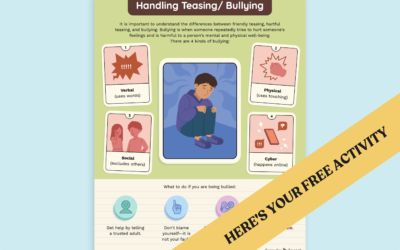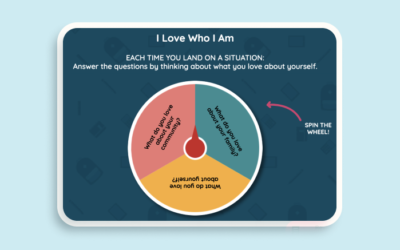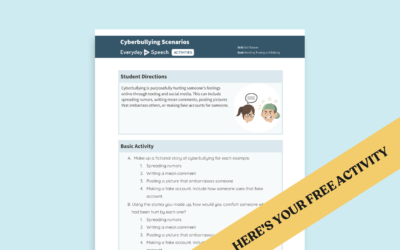Everyday Speech Blog
Social Skill Lesson Plans and Articles
20+ Self-Esteem Activities for Teens (Middle & High School)
Self-esteem plays a major role in how teens handle challenges, express themselves, and make decisions. But it doesn’t develop on its own. It’s built through small moments—when students reflect, speak up, or learn from a setback. This page offers no-prep,...
Anti-Bullying Activities and Resources: Help Students Take Action
Teaching students to prevent bullying starts with clear language, real examples, and consistent practice. Many students understand that bullying is wrong, but they may not know what it looks like in real life. Some may confuse it with teasing or conflict. Others may...
How to Teach Online Communication Skills (with examples!)
Online communication is a daily part of students’ lives — yet the skills it requires are often overlooked in traditional social skills instruction. Whether students are emailing a teacher, texting a friend, or joining a group chat, the social expectations shift...
Teaching Digital Citizenship: Skills, Strategies, and No-Prep Resources
Digital citizenship isn’t just about screen time or internet safety rules — it’s about how students show up online. Whether they’re texting a friend, sharing a photo, or using AI for a class project, students are constantly making decisions that affect how they’re...
How to Help Students Manage Their Screen Time
Screens are a constant presence in students’ lives — shaping how they connect, cope, and communicate. But while most kids know how to use technology, far fewer understand how it affects their mental health. Many students rely on screens not just for entertainment or...
Free Interactive Spinner Activity for High School: I Love Who I Am
By high school, students are forming strong opinions—about the world, their peers, and themselves. But often, the loudest internal voices are critical ones. Teens may struggle to see what makes them unique or valuable. The I Love Who I Am spinner activity helps...
Free High School Poster: How to Handle Rejection with Confidence
Rejection is a normal part of growing up. But that doesn’t mean it’s easy to handle—especially for high school students still developing their sense of identity, value, and resilience. Whether it’s a missed opportunity, a social slight, or a disappointing outcome,...
Free High School Worksheet: Teach Students How to Recognize and Respond to Cyberbullying
Teens spend a huge portion of their lives online—but they’re not always prepared for what happens there. Messages can be misread, group chats can turn mean quickly, and social media posts can escalate in ways that leave real damage. The Cyberbullying Scenarios...
Free Poster for Bullying Prevention: Give Students a Simple Plan for Speaking Up
Students don’t need a long lecture to understand that bullying is wrong—but they do need support figuring out what it actually looks like, how to name it, and what to do when they experience it or witness it. The Handling Teasing and Bullying poster from Everyday...
No-Prep Activities
Changing the Channel on Big Emotions: A Guide for Educators
Introduction Emotions and feelings are an inherent part of our daily experiences, and they can be both positive and negative. Sometimes, we encounter big, negative emotions like anger, frustration, or sadness, which can dominate our thoughts and impact our...
Teaching Conflict Resolution and Problem Solving Skills to Special Education Students
Introduction Conflicts are a normal part of life, and learning how to navigate them is an essential skill for students in Special Education. In this blog post, we will discuss the importance of teaching students to handle conflicts with friends using the Problem...
5 Golden Rules of Play for Elementary Students: A Guide for Educators
Introduction Playing with others is an essential part of children's development, and establishing a set of guidelines can help ensure that everyone has a positive experience. The Five Golden Rules of Play are designed to help elementary students learn how to interact...
Enhancing Focus and Self-Regulation with the Five Finger Breathing Exercise
Introduction Incorporating Social-Emotional Learning (SEL) into the classroom is essential for fostering healthy emotional development, social skills, and overall well-being in students. One effective way to introduce SEL is by teaching students self-regulation...
Teaching Kindergarten Students the Importance of Asking Permission
Introduction Asking permission is a crucial skill for young learners to develop. It teaches them the importance of respecting others' belongings and personal space, and helps to foster a positive classroom environment. In this blog post, we will discuss the concept of...
Teaching Problem-Solving Skills through Social-Emotional Learning
Introduction Problem-solving skills are essential for students, especially those in special education. These skills can help students navigate their emotions, communicate effectively, and build positive relationships with peers and educators. In this blog post, we'll...
Teaching High School Students the Art of Humility and Avoiding Bragging
Introduction As educators, it's essential to help our high school students develop strong social-emotional skills. One such skill is understanding the importance of humility and how to avoid bragging. Bragging can make others feel annoyed or inferior, and it's crucial...
Understanding Relationships with the Relationship Ruler for PreK Students
Introduction As educators, it's essential to teach PreK students about the relationships they have with different people in their lives. Developing an understanding of these relationships helps them interact appropriately with others and fosters healthy...
Empathy: A Key Skill for Building Strong Friendships in Middle School
Introduction Empathy is the ability to understand how someone else feels and show care for their feelings through words and actions. It forms the foundation of strong relationships and helps us forge bonds with others. In a world where friendships play a crucial role,...
Teaching Kindergarten Students to Walk Slowly and Quietly in the Halls
As educators, we aim to create a respectful and calm learning environment for our students. One essential aspect of this is teaching them how to walk slowly and quietly in the halls. In this blog post, we will explore a no-prep activity to help Kindergarten students...
Teaching Open-mindedness to Elementary Students: Activities and Discussions
Introduction Dealing with change and accepting others' ideas can be challenging for children. When a child has a Closed Mind, they stick to their own ideas and are unwilling to consider other perspectives. This mindset can lead to feelings of worry and frustration and...
Developing Independence: A Guide for Educators of Middle School Students
Introduction Gaining independence is a crucial part of growing up, especially for middle school students. As they grow, students learn to take initiative, do things on their own, and rely less on others for guidance. Developing independence has numerous positive...
Switching Tracks: Adapting to Change in Group Activities
Introduction Switching Tracks is a crucial skill that helps students adapt to change, particularly when working in groups. Change can be challenging, and unexpected alterations in plans can cause feelings of anxiety or upset. To better navigate these situations,...
Teaching PreK Students the Value of Helping Others and Building Friendships
In this blog post, we will explore the importance of teaching young children the value of helping others and building strong friendships. By incorporating principles of Social-Emotional Learning, educators can impart essential life skills that will enable students to...
Teaching Effective Classroom Entry Skills: Activities and Discussions
Creating a positive learning environment starts with how students enter the classroom. Teaching students effective classroom entry skills is an essential aspect of Social-Emotional Learning (SEL). In this blog post, we will discuss an easy-to-implement no-prep...
























